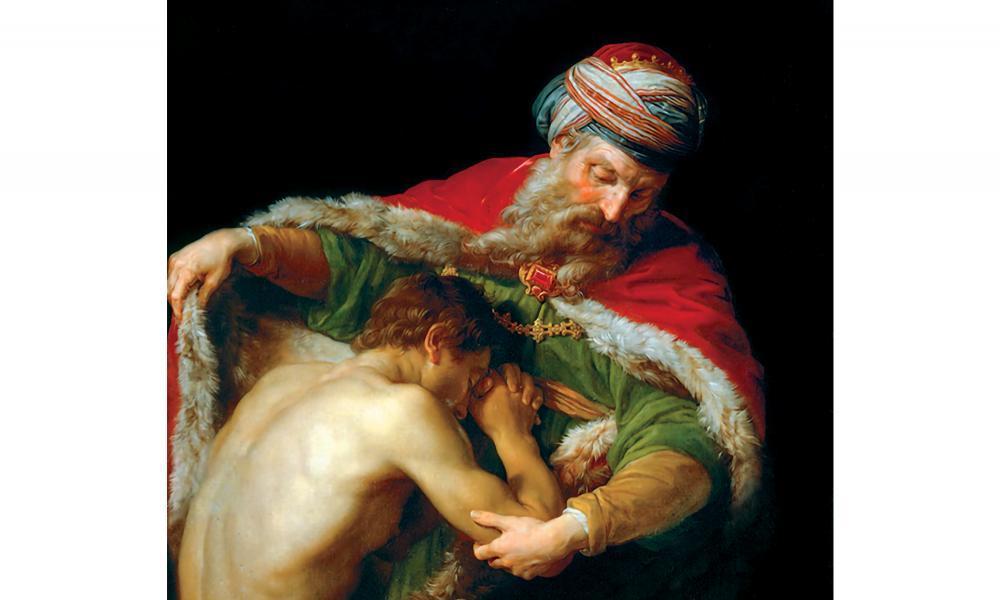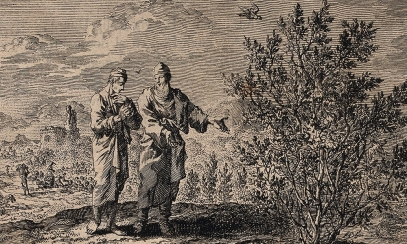
Lessons in Mercy: The Lost Son
The motto for the Year of Mercy is “Merciful like the Father.” Perhaps no parable is better suited to teach us what this motto actually looks like in practice than the Parable of the Lost Son.
The parable
In the Gospel of Luke (15:11-32), Jesus follows his parables of the lost sheep and the lost coin with a story about a father and his two sons. The parable begins with the younger of the sons asking and receiving from his father his share of his inheritance. This younger son then leaves his father’s home, squanders his money and eventually finds himself tending swine on a farm. Dying from hunger, he finally resolves to return to his father’s house, beg his father’s forgiveness and seek employment as a servant.
However, when the father sees his son approaching, he runs to him, embraces and kisses him, and orders that his son be given “the finest robe,” a ring, sandals and a feast. When the eldest son, who had been out in the field, returns to the estate and hears music and dancing, he is confused and asks a servant what is happening. Upon hearing that a feast is under way to celebrate the return of his brother, the eldest son grows angry and refuses to enter the house.
When the father goes out to his eldest son, the son complains that it is unfair for his brother to receive such a feast. After all, his younger brother had abandoned them and spent his money in dissolute living. Meanwhile, he points out that he has always been faithful to his father, but has never been treated to such a celebration. To this, the father replies, “My son, you are here with me always; everything I have is yours. But now we must celebrate and rejoice, because your brother was dead and has come to life again; he was lost and has been found.”
The lesson of the younger son
We do not know what motivated the younger son to ask for his inheritance. Perhaps, he wanted his freedom: from his father’s rules, from financial dependence, from work, duty and responsibility. Whatever the reason, he was unwilling to wait until his father passed away to receive his portion of the estate. Instead, he sought, in effect, to declare that his father was already dead to him.
The younger son chose to reject his father. He chose to live as though his father did not exist. He lived only to satisfy his every desire for self-gratification. His decision led him to eventually lose his money, self-worth and that very freedom he so much wanted.
In the depths of despair and regret, he decided to return repentant to his father as a servant, rather than as a son. He found the immediate forgiveness of his father and the restoration of his familial status. In a word, he experienced the unconditional mercy of his father.
The father had not wanted his younger son to leave, but he would not force the younger son to stay. Instead, the father decided to respect his son’s choice, even when the choice meant he would lose his son. Our heavenly Father, likewise, does not force us to love him or remain in communion with him. He respects our free will and honors our choices, even when the choice is to reject him.
At the same time, the father’s desire for communion with his son explains his immediate and unconditional welcoming of the son back into the family. Nothing the son had done could exclude him from receiving the father’s forgiveness once he made the decision to turn back and repent. Further, the father, like our heavenly Father, not only offered forgiveness, but was also filled with joy because the finding of his son anew restored the order of his relationship with his son. It made communion possible again.
The lesson of the faithful son
Now the faithful son had to deal with his younger brother running off with a large portion of his father’s wealth in order to live a life of debauchery. He also had to manage the increased responsibility for the family business he inherited. It is not difficult to imagine the seeds of resentment taking root in the faithful brother’s heart.
When he returned from the field one day to learn of his brother’s return and of his father’s reaction, there were no tears of joy. On the contrary, a tremendous sense of injustice overcame the faithful son. He had been the good son. He had stayed and fulfilled his duties to his father. How could his father be so unfair, so unjust?
The father now bears the older son’s anger over the reception. He first assured his son that everything he had was the son’s as well; that his mercifulness to his younger son did nothing to diminish his older son’s position. Then, he invited his older son to enter into his joy over the return of his younger son, to be merciful like the father.
This invitation was an invitation into a deeper participation in the life of the father. Certainly, the eldest son had remained faithful and obedient, but his path to growth in spiritual perfection lay in the direction of taking on the mind, love, heart, and thought of the father – to see through the father’s eyes. It is an invitation that our heavenly Father extends to each of us today.
QUIZ
Test your knowledge of what the Bible has to say about mercy …
“Merciful and gracious is the Lord, slow to ______, abounding in ________.”
A. see; distraction
B. rebuke; gentleness
C. anger; kindness
D. forget; forgiveness
Answer: (C) – anger; kindness (Ps 103:8)



